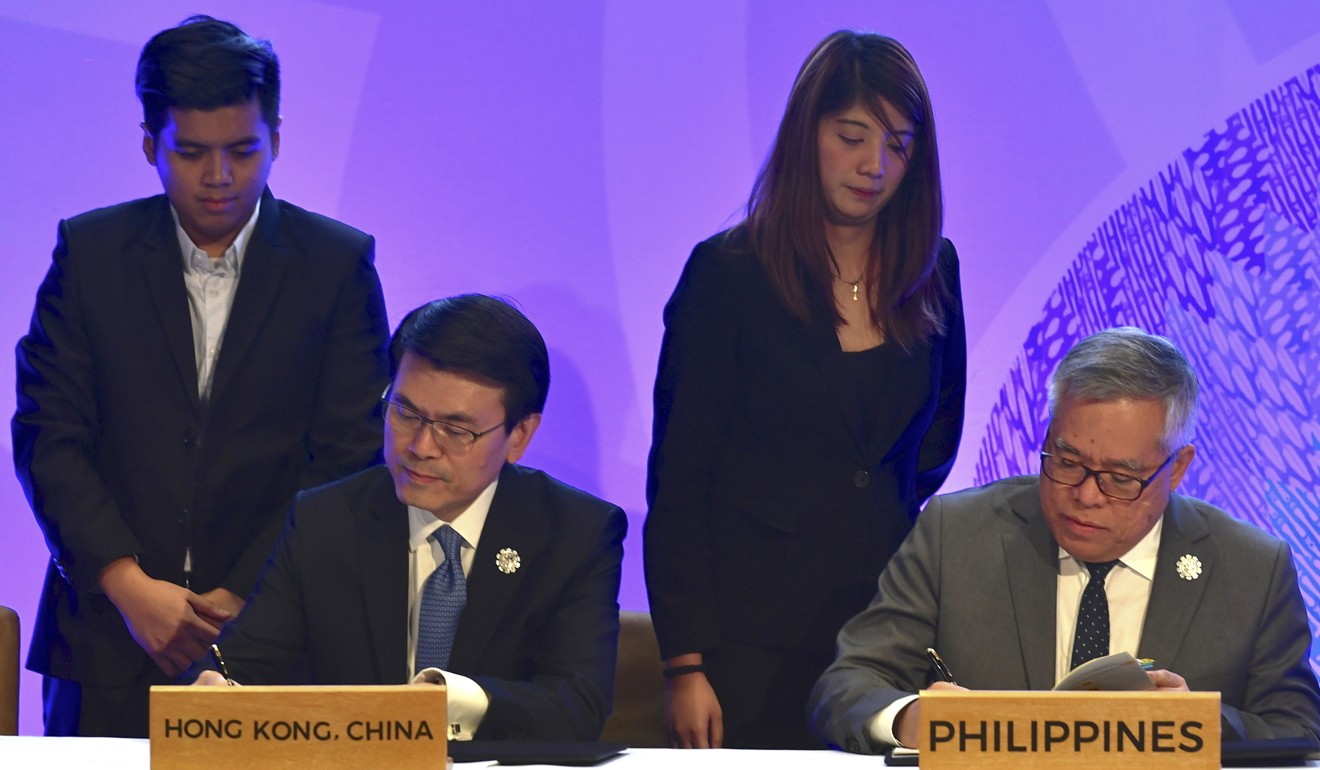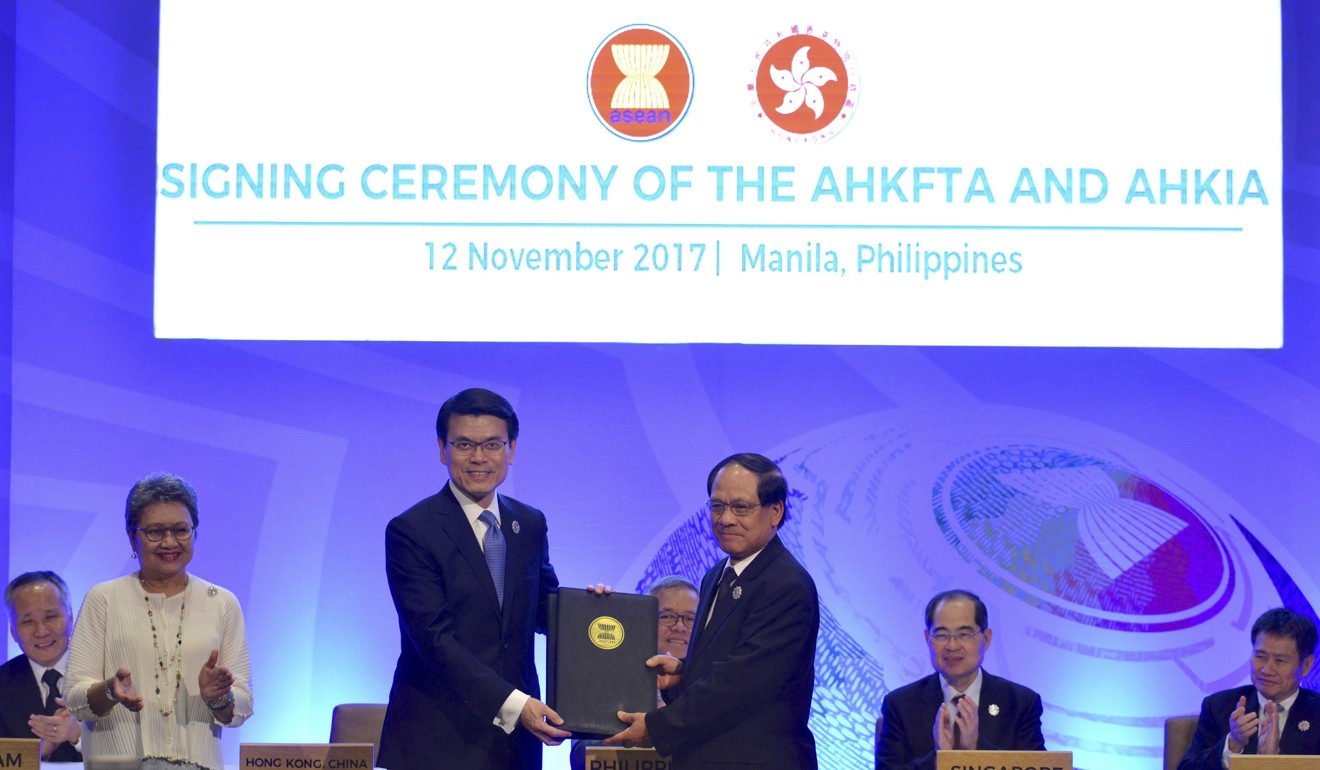
Hong Kong’s Asean deals are ‘loud and clear’ vote against rising regional trade protectionism
City’s businesses will enjoy lower tariffs, fewer restrictions and better protection in 10 countries
Hong Kong signed long-awaited free trade agreements on Sunday with the Association of Southeast Asian Nations, which means the city’s businesses will enjoy lower tariffs, fewer restrictions and better protection in 10 countries in the region in the years to come.
Secretary for Commerce and Economic Development Edward Yau Tang-wah, representing Hong Kong at the talks, called the agreement a “loud and clear” vote against rising regional trade protectionism.
“Asean is Hong Kong’s second largest trading partner in merchandise trade and the fourth largest in services trade. The two agreements are of great importance to Hong Kong,” Yau said.
“Hong Kong, being a free trade promoter and advocate of a strong, rule-based multilateral trading system, will continue to take this pathway [and] continue to do our utmost.”
Hong Kong plays catch up in Asean after two decades of wasted opportunity
The agreements, which had been in discussion since 2014, will take effect on New Year’s Day 2019 at the earliest. They cover a wide range of areas of trade in goods and services, such as Hong Kong’s core industries of tourism and professional and financial services, as well as telecommunications, technical cooperation and dispute settlement and arbitration.
Yau said the agreements will create a “more conducive environment” for the city and the region’s economy.

Since 2012, bilateral merchandise trade between Hong Kong and Asean grew by an average of 3.4 per cent annually. Last year, the total merchandise trade between the two amounted to HK$833 billion.
In terms of business benefits, the agreements covered four key aspects, namely tariff reduction for the trade in goods, fewer restrictions for trade in services, longer stay for business travellers, and better and fairer investment protection.
How Asean can save Hong Kong from losing out to Singapore on China-related trade
The free trade agreement and a related investment agreement were signed on the sidelines of the Asean Summit and its related meetings in Pasay, a neighbouring city of the Philippine capital of Manila. The Asean Summit will be officially opened on Monday.
On tariff reduction, Yau said Asean member states had agreed to eliminate or reduce customs duties on goods from Hong Kong.
“Hong Kong enterprises in export trade can benefit from the … lower operation cost and improved market competitiveness,” he said.

Last year, Hong Kong paid a total of HK$570 million (US$73 million) in tariffs on its exports to Asean.
On trade restrictions, the two sides committed to removing barriers on foreign capital participation and the number of people employed. Thailand, the Philippines and Vietnam will allow Hong Kong enterprises to account for up to 50 per cent or even full ownership of enterprises.
This new agreement turns a new page for our trade, logistics and investment sectors
On facilitating entry and stay, Hong Kong business visitors will be allowed to stay in an Asean country for up to 90 days. Currently, seven of the Asean countries only allow Hong Kong travellers to stay for 14 to 30 days without a visa.
Hong Kong Productivity Council chairman Willy Lin Sun-mo, who is formerly a deputy chairman of the Federation of Hong Kong Industries, welcomed the agreements.
“For factory owners like us, we did not have any protection over our investment in those countries,” Lin said. “This new agreement turns a new page for our trade, logistics and investment sectors.”
Textiles and garment sector legislator Felix Chung Kwok-pan, of the Liberal Party, said the tariff reduction and investment protection were the most important of the four aspects.
“Without investment protection, manufacturers could only turn to Beijing for help when they suffered in Vietnam,” Chung said, in reference to anti-China protests in the country in 2014.
Malaysia’s International Trade and Industry Minister Datuk Seri Mustapa Mohamed, who also joined the signing ceremony, said Asean welcomed Hong Kong as a new partner.
Meanwhile, Chinese Premier Li Keqiang arrived in Manila on Sunday for an official visit to the Philippines and a series of leaders’ meetings on East Asian cooperation.
Additional reporting by Laura Zhou in Manila and Reuters

